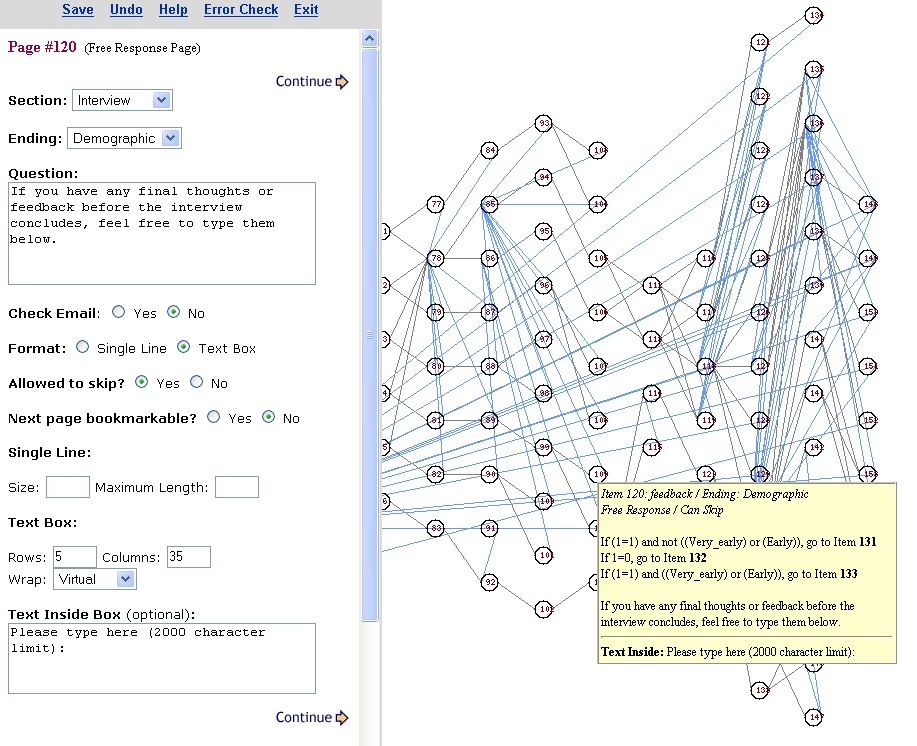eInterview.org is a Social Psychology Network partner site headquartered at Wesleyan University. The purpose is to conduct web-based interviews capable of changing questions, response options, and item wordings depending on the previous answers given. Development of eInterview.org began in 1999 with funding from the National Science Foundation, and the site was released in 2007.


Note that in the last question, eInterview.org combined earlier information on the respondent's Internet usage and citizenship to ask the same kind of question that a human interview might. This ability to synthesize information greatly extends the ability of researchers to probe topics of interest.
The Technology
The technology behind eInterview.org involves two distinct but closely connected systems: the "public" side that visitors see, and the "administrative" side that researchers use to create and edit interviews. To see an example of what the administrative side looks like, click on the thumbnail image below.

In the administrative interface, the right side shows a diagram in which each node represents an interview item, and the left side displays a panel with functions to manage item wording, logic, and other interview attributes. Positioning one's cursor over a particular node shows a summary of the item, and clicking on a node loads the item into the panel on the left.
In addition to typing regular items, researchers can define contingent wording variables, "macros" (large strings of logic), debriefing scenarios, and many other aspects of the interview. Typically, it takes 1-2 hours of training to use the full system.
Design Features
eInterview.org was designed to be as user-friendly and flexible as possible. Here are just a few of its features:
Advantages of online interviewing
Online interviews offer several advantages over face-to-face and telephone interviews. First, they are frequently the most cost effective way to reach large, diverse samples. This benefit is especially valuable when conducting international studies.
Second, online interviews are available 24 hours a day, 7 days a week, from any location with Internet access. This availability is convenient for respondents and allows researchers to collaborate over geographic distances.
Third, respondents often answer sensitive questions more truthfully online than face-to-face, and respondents are able to give more thoughtful, complete answers online due to the self-paced nature of the interview.
Fourth, online interviews improve data accuracy through real-time response checking and by eliminating transcription and data entry errors. For these and other reasons, online interviewing is an ideal choice for many projects.
Other Potential Uses
Although eInterview.org is powerful enough to use for carefully controlled research studies, it can also be used to assess employee performance, screen job applicants, deliver interactive training, evaluate or pilot-test materials, and so on.
To take a hypothetical example, eInterview.org could use video clips, images, and case histories to train physicians in different regions to accurately diagnose a fast-spreading pandemic. At the end of a training module, eInterview.org could then test physicians, route them for additional training in weak areas, and test them again, all while collecting cross-cultural data on the effectiveness of various training materials.
Similarly, eInterview.org modules could be set up to train emergency relief workers how to respond rapidly to natural disasters or terrorist attacks, and if the system detects response latencies above a certain threshold, it could provide additional training to speed up responses.
In the realm of social psychology, eInterview.org could go beyond a standard interview to prime respondents and then measure implicit and explicit attitudes. Or the system could test respondents, provide real-time feedback, and then explore the attributions people make for strong or weak performances.
As these examples make clear, eInterview.org can be used for a wide variety of purposes beyond traditional interviewing.
Research Team
The eInterview.org website was created by a research team headed by Professor Scott Plous of Wesleyan University. The computer program was written by David Jensenius and Vasilios Hoffman; the website layout was designed by Mike Lestik and Scott Plous; and several student researchers contributed their time and talent to the project, including Michael Barrett, Joel Bartlett, Susan Brudner, Sho Chang, Rebecca Duke, Deanne Dworski-Riggs, Jennifer Fields, Emily Gupta, Jonathan Leland, Andrew Magarie, Holly Mehr, Jessica Necheles, Chelsea Quann, Jennifer Ryan, Alexandra Sedlovskaya, Sabelo Sibanyoni, Randolph Vesprey, Rebecca Weisgrau, Michele Wellington, Max Wu, and Curtis Yee.
The Current Interviews
At the present time, eInterview.org offers two interviews: the "Diet and Lifestyle Choices Interview" and the "Race and Advertising Interview." The Diet and Lifestyle Choices Interview was initially pilot-tested in a traditional face-to-face format by Arthur Baraf and Scott Plous in 1998. The Race and Advertising Interview was adapted by Sho Chang and Scott Plous from a telephone survey conducted by Lynn St. Martin and Scott Plous in 2000. Both of these interviews have been reviewed and approved by the Wesleyan University Institutional Review Board.
Using or Licensing the Technology
The eInterview.org system is not currently available for use on other web servers, and eInterview.org is not presently hosting interviews developed by other researchers. Once the system has been fully field tested, we hope to make it available to others. If you would like to discuss the possibility of using this technology for your own projects in the future, you may reach us by clicking on "Contact Us" above.